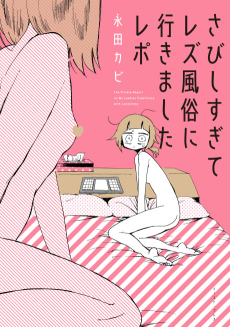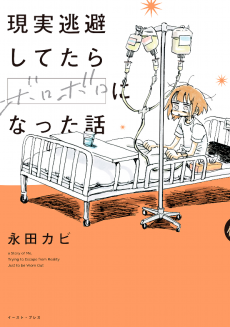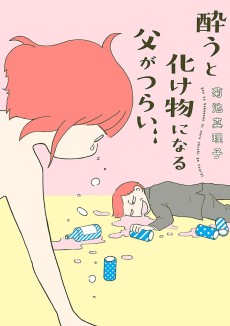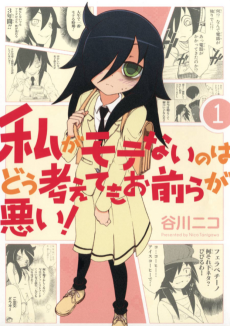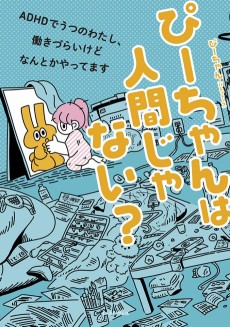HITORI KOUKAN NIKKI
STATUS
COMPLETE
VOLUMES
2
RELEASE
November 13, 2017
CHAPTERS
28
DESCRIPTION
Struggling with the idea of living alone and adjusting to the effects of her previous book’s success, this follow-up to the award-winning autobiographical comic continues the author’s quest for self-acceptance and love.
(Source: Seven Seas Entertainment)
Note: Includes 3 extra chapters and the one-shot “Chika-chan no Yuuutsu”.
CAST
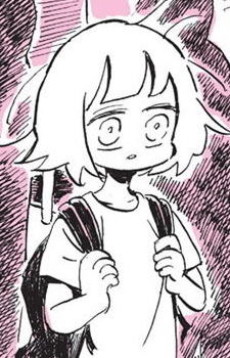
Kabi Nagata
CHAPTERS
RELATED TO HITORI KOUKAN NIKKI
REVIEWS

saulgoodman
80/100The suffering from loneliness continues. Change and stagnation embody life.Continue on AniListAs I approach my 21st year celebrating my departure from my mother's womb, my disarray over the connotations of adulthood makes me want to retreat back inside from whence I came.
Doing the opposite of healthy rehabilitation by actively seeking out manic, pessimistic series for the last few years, Kabi's My Lesbian Experience with Loneliness was a forlorn blessing along with Welcome to the N.H.K. and Neon Genesis Evangelion. Unembellished, ugly and hurtful; Kabi depicted the universal harshness of post-high school life and isolative entrapment within familial companionship that transcended the esoteric barriers of clinical depression and eating disorders. There was no dramatic epiphany upon its conclusion, as Kabi instead clarified my despondency towards my awkward and ongoing transition to adulthood. Despite her cute chibi art-style, Kabi had encapsulated the ugliness of burdening societal expectations, loneliness, mental illness and family.
Privileged as I may be, compared to Kabi's situations, she nonetheless dragged me by the arm into her despairing rhythm and I sought for more in this sequel recounting her life after the success of My Lesbian Experience with Loneliness.

Dear Diary While the prequel had a straightforward and self-explanatory title, I was a bit mystified with "solo exchange diary". Was it just simply a diary, seeing as how "solo" and "exchange" negated each other? Upon light research (à la Wikipedia), I came across this tidbit of information:
Entries take the form of a normal diary. There are, however, subtle differences. While an entry might talk about a person's day or activities since the people last met, the entry will be written in a different way. The writers, rather than being totally honest with themselves, will instead be writing what he or she wants the reader to see.
The format of an exchange diary can also be good for therapy, because it gives someone a platform to write about her problems and experiences. Sometimes, a lack of honesty can be an issue. However, the same is true in face-to-face therapy settings. As long as the patient remains aware of not being totally honest, progress towards well-being is possible.
Which gives the title much more nuanced context, being that Kabi does the sheer opposite of an exchange diary's purposes. Exchange diaries hinge on reader expectations rather than the author's truth, much like how society and Kabi's family hinge on their own fixed expectations of Kabi. At the same time, however, the "truth" is embellished, as well. As much as an autobiography has to do with real-life events and individuals, that doesn't necessarily include objective truth, as this is accounted from a single individual's own perspective of events.
The therapeutic sense of an exchange diary reinforces Kabi's storytelling. Rather, it is the storytelling, and a great choice at that. The clumsy pacing of events, undefined story structure and author narration twins with Kabi's less-than-gracious lifestyle and dilemmas. Because it doesn't follow a solid, three-part story structure. My Solo Exchange Diary really does feel realistic, in the sense that that there is no easily-spliced structure in Kabi's life.

A healthy family is a happy family My Lesbian Experience with Loneliness concluded with various unconcluded issues. One key issue being Kabi's tense relationship with her family. This and the fact that she hesitated revealing the privacy-breaching material she wrote to them was just a volcano waiting to erupt.
Family dynamics are difficult and annoying. It's hard to discern who's right and wrong in another's family drama because you're not part of the household. As such, I'm sure many of us have been hit with "They're doing/saying that because they love you" in response to our rapid-fire complaints of them. And in the case of Kabi, it's the same. Especially with how her emotions towards her family often shifts from anger, guilt, depression, gratefulness and others; it's difficult to exactly conclude if she loves or hates her family and whether her family is as villainous as she depicts. Which is how I believe what having family is like; a blur of emotions and tied by obsidian-clad rope. I love how I couldn't one-sidedly sympathize with Kabi or her parents.
In My Solo Exchange Diary, my breath momentarily ceased when Kabi's parents find out about My Lesbian Experience with Loneliness from another source than Kabi herself. And to say the least, it was gut-wrenching. Kabi hadn't been aware of the massive consequences of her writing, too focused on the cathartic sense of it to realize that it'd stir up feelings of betrayal, guilt and embarrassment for her family. Numbingly thrashing her copies of the book with her fists until they were dyed deep red and attempting to overdose on pills, I certainly hadn't expected a happy outcome to the reveal but was nonetheless crushed imagining how it played out in real life. The only remotely happy resolution to this, however, was her grandmother's warm smile and quiet praise.
Confessing secrets to one's family is hard. One's family finding out the secret by themselves is miles and miles more gut-wrenching. Despite the expected support of those with shared blood and the accumulated closeness we share, there's no discerning what their reactions will be. And for Kabi, it was just as she had expected. Disappointed and embarrassed, her parents were the farthest from warmly welcoming their daughter's career. Despite their relationships moderately improving by the end, as they hold a warm celebration for Kabi's release from the hospital and Kabi taking her parents for a trip with her own money, there's no definite guarantee that their dynamics will flatline with the slight optimism it ended on.


The cycle goes round and round One of Kabi's defining traits is her perennial, swish-swash of emotions. She frequently contradicts herself and continuously changes her feelings about a matter, especially with her mother. There's rarely any defined, lasting development or regression in her character. She suffers from panic attacks in one chapter, then feels momentarily rosy in the next. She chugs massive intakes of beer to cope one day, then productively works on her manga the next. This is what gives the story its atypical structural flavor, in that story and character development don't exist in a smooth upwards or downwards direction. It's merely a broken, revolving laundromat washing machine forever rinsing Kabi on cold.

Blob Kabi's art is a great driving force behind the depressive narrative, as well.
The chibi art-style and pink palette color tone, of course, contradict the serious subject matter of the story. It's cute and often amusing, seeing the blank and deadpan blobby facial expressions. Beyond the character designs, however, there's surprising detail going into other aspects of the art.
The most clever and appreciative aspect of the art is the symbolism. Kabi often inserts easy-to-understand visuals describing her intangible thoughts and feelings, such as an infographic of happiness and loneliness. For less technical depictions, Kabi physically abuses herself with gaping holes in her abdomen and bloody knife wounds. It felt as if I was reading a psychoanalytic children's picture book.
The background art should also be praised. Smoky blackness is present in nearly every panel to depict the severity of Kabi's current state of mind and she implements some other subtly clever tricks and techniques to portray the present tone.



Conclusion Kabi continues to struggle and deviate from her ideal life and expectations of those around her in the sequel to My Lesbian Experience with Loneliness. Forlorn and depressed, Kabi stumbles face first into the dirt as she deals with several consequences that trailed off in her previous work. Her family, clinical depression, self-harm and alcohol addiction are anything but development from where she had left off. Life is ugly, hurtful and changing; and so is Kabi. Kabi depicts herself as a cutesy chibi figure, yet none of her humanity is removed in the process. The pretty pink palette choice does nothing to deflate her cumbersome experiences that have occurred and yet to occur.
Just like its predecessor, My Solo Exchange Diary has no definite end. Kabi will continue to both progress and regress as life throws at her unforeseen joys and tragedies. This isn't an underdog story or an inspirational anecdote, what Kabi wrote was to digest the events in her life. Rather than a story, My Solo Exchange Diary is a therapy patient's shaky musings. It's ugly, it's beautiful and it's soothingly painful to read when you're also listlessly wandering about in life.

SIMILAR MANGAS YOU MAY LIKE
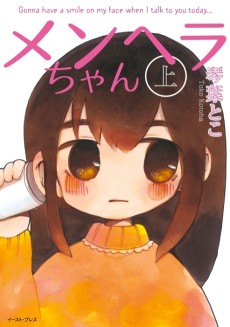 MANGA ComedyMenhera-chan
MANGA ComedyMenhera-chan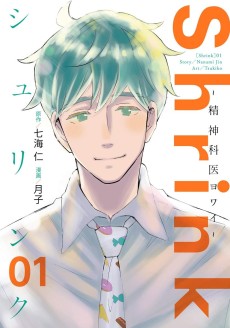 MANGA PsychologicalShrink: Seishinkai Yowai
MANGA PsychologicalShrink: Seishinkai Yowai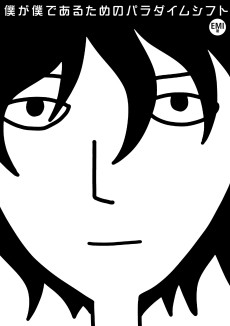 MANGA PsychologicalBoku ga Boku de Aru Tame no Paradigm Shift
MANGA PsychologicalBoku ga Boku de Aru Tame no Paradigm Shift
SCORE
- (4/5)
MORE INFO
Ended inNovember 13, 2017
Favorited by 368 Users

